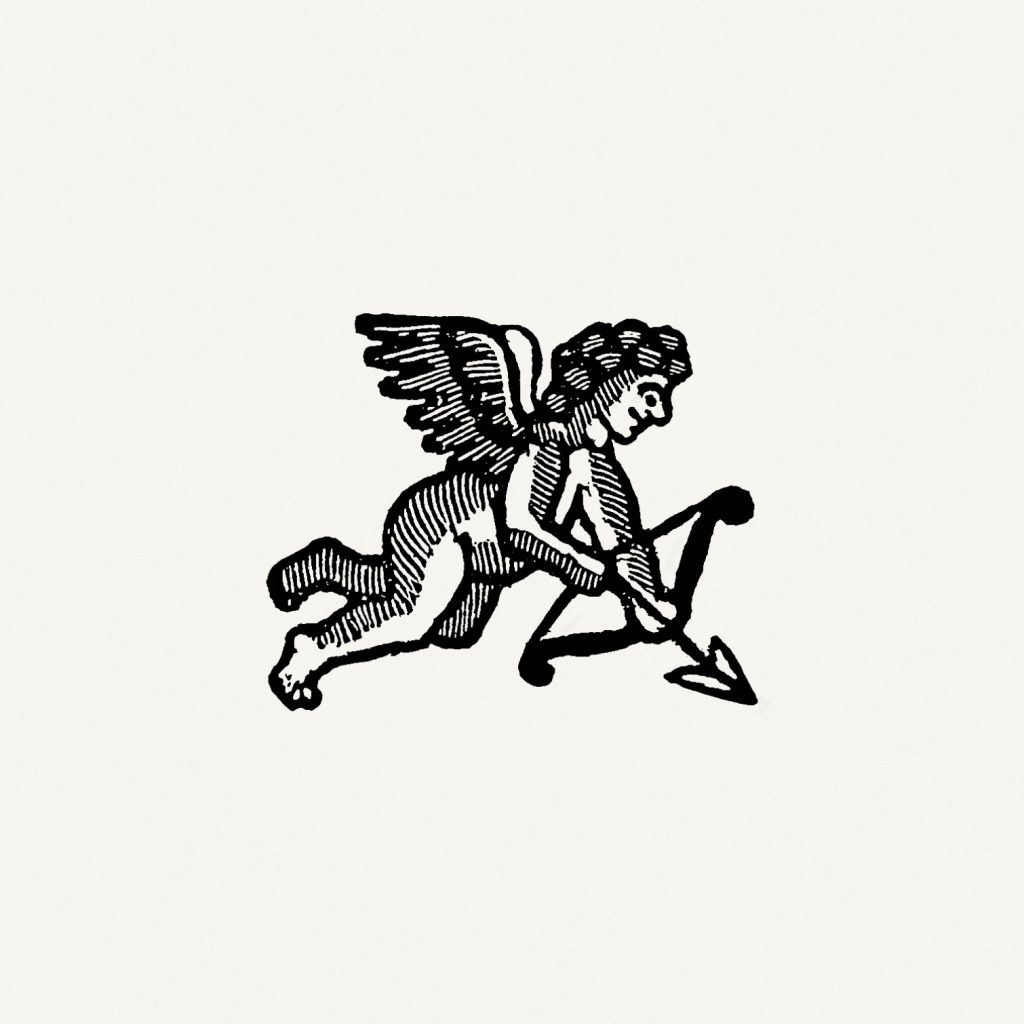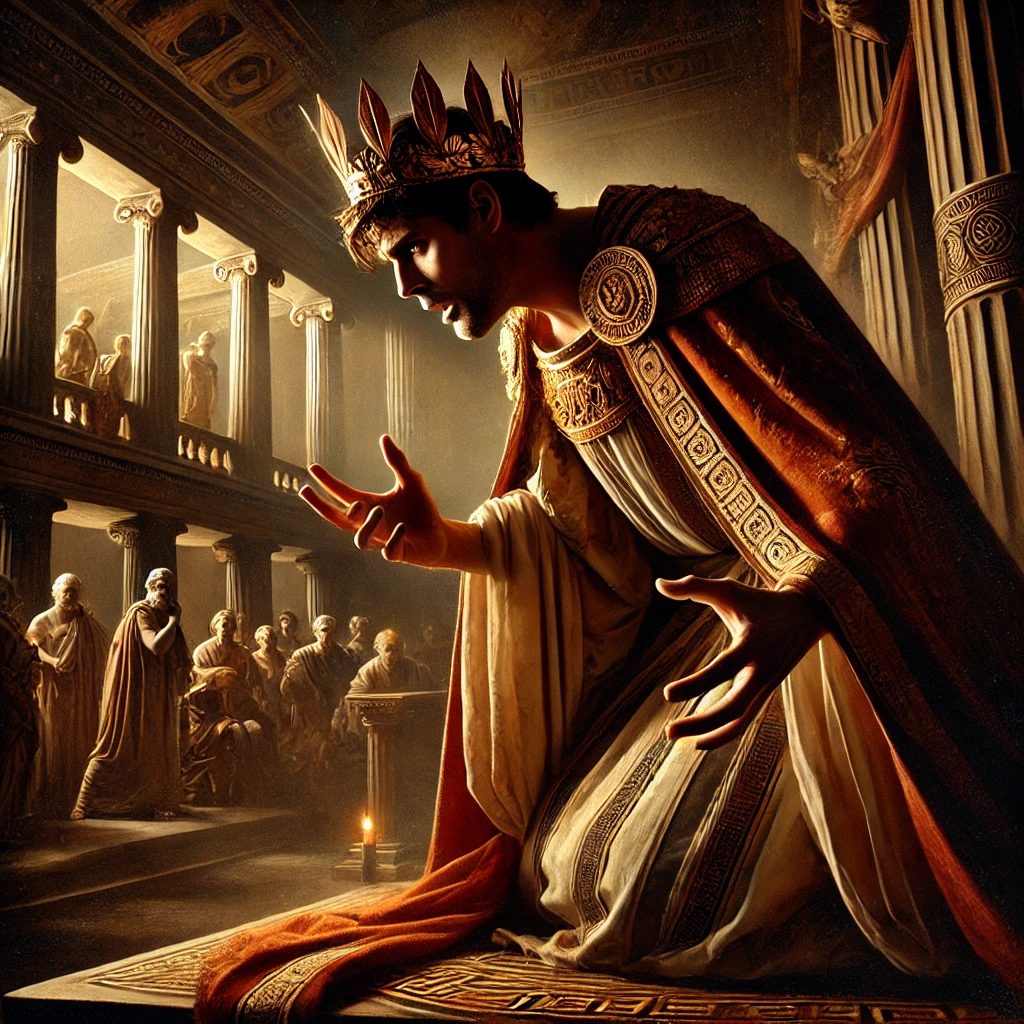Greek mythology is no moral or ethical shit, and I’m rambling on about the psychology from there.
Mr. Nagoshi, a psychiatrist. I guess there are not many psychiatrists who can analyze so much. It is amazing that he can talk so much about game characters and stories. If you have time, please watch it because it will be helpful.
I’ll tell you a story about King Oedipus of Greek mythology that came out of Mr. Nagoshi’s talk on this channel (in another video).
From this point on, the content is a bit difficult to read, but I will leave it up to you to decide whether you are interested or not, and I have no intention of blaming you or anything like that.
Oedipus the Great
King Oedipus is a tragedy written by the ancient Greek playwright Sophocles, and is one of the most famous of all Greek tragedies, praised by Aristotle as “the masterpiece of tragedy.”
The play depicts the strange fate of Oedipus, King of Thebais, and the terrible truths he uncovers in his pursuit of the truth.
Synopsis (as described by chatGPT)
Background.
The city of Thebai is suffering from a plague. Oedipus, the king, decides to receive an oracle to discover the cause of this plague. The oracle tells him that the cause of the plague is that the murderer of Laius, the former king of Thebai, has not been captured.The investigation begins.
Oedipus begins to investigate the truth behind Laius’ death. He summons the soothsayer Teiresias, who warns him that “to know the truth would bring disaster. Oedipus questions him, and Teiresias finally tells him that Oedipus himself is responsible for Laius’ murder. Oedipus does not believe him, and he vehemently condemns Teiresias and his entourage.Mystery of the Past Revealed
Oedipus gradually begins to doubt the truth about his birth. Eventually, in the process of discovering the truth, it is revealed that he was a prince who was abandoned as a child, unwittingly killed his father Laius, and married his mother Iocaste. This fact was foretold by the oracle, the very fate that Oedipus was trying to avoid.The Tragic Conclusion
After the truth is revealed, Iocaste, his mother and wife, commits suicide, and Oedipus is blinded by the gouging out of his own eyes. The play then ends with his abdication of the throne and exile from Thebais.Themes
The themes of “Oedipus the King” are fate, free will, and human limitations.
Fate: Oedipus’ destiny was determined by an oracle and could not be avoided no matter how hard he tried.
The Quest for Truth: Oedipus pursues the truth, but his pursuit leads him to a catastrophic end.
Human Ignorance: Oedipus’ pursuit of truth leads him to a catastrophic end.
Significance of “Oedipus the KingThis work offers some of the most profound philosophical insights in ancient Greek literature and continues to influence many literary works and philosophical discussions today.
It is also the origin of the Freudian psychological term “Oedipus Complex”.

The point is that if you didn’t know the secret of your birth and didn’t go to the country of your birth from a misunderstanding, a misunderstanding, you wouldn’t have killed your father and you wouldn’t have ・・・・ with your mother, and it’s too tragic a story.
It’s graphic, it’s a myth, but there’s incest.
Freudian and Adlerian psychology
Freudian and Adlerian psychology were both working together, but Adler criticized Freud on this issue, and the two had a bitter argument that led to the creation of Freudian and Adlerian psychology.
Sigmund Freud
Sigmund Freud (May 6, 1856 – September 23, 1939) was an Austrian neurologist and the founder of psychoanalysis.
He was a pioneer who sought to elucidate the human psyche from an innovative perspective, including the unconscious, dreams, desires, and the structure of the mind, and had a major impact on modern psychology and psychiatry.

Psychology, or just the instinctive part… Freud’s theory has deep insights into the human mind from the instinctive and unconscious part as well as the rational part.
Even within psychology,
His approach is particularly unique in that he focuses on “instinctive impulses” and “unconscious forces.
He believed that many human behaviors and emotions are influenced by repressed desires and memories in the unconscious. It emphasizes the relationship between instinct and the unconscious.
What is the Oedipus Complex?
The Oedipus Complex is a psychological condition in which a child in early childhood (around 3-6 years of age) unconsciously develops sexual affection toward a parent of the opposite sex and at the same time develops competitive and hostile feelings toward a parent of the same sex.
In the case of boys (Oedipus Complex) boys develop affection for their mothers and see their fathers as rivals. This affection is unconscious and is usually suppressed by social norms and morality.
In the case of girls (Electra Complex) Carl Jung, a disciple of Freud, used the term “Electra Complex” to describe the girl version. In this case, the girl is affectionate toward her father and sees her mother as competition.
Resolution of this complex
According to Freud, this complex should be resolved as the child grows up, and in the process the child forms a Super-Ego.
The super-ego is a psychological structure that internalizes social norms and morals and serves to control desires.
The boy suppresses feelings of hostility toward his father and resolves his complex by identifying with him.
Similarly, girls control their affection for their fathers while repairing their relationship with their mothers.
Significance of the Oedipus Complex
Part of psychological development
Freud considered the complex an important stage in human psychological development. When properly resolved, it is the foundation for healthy character development and relationships.
Repression and the Unconscious
When not fully resolved, desires can be repressed and affect the unconscious. This repression may lead to psychological problems and neuroses in adulthood.
Criticisms and Modern Evaluations
Freud’s Oedipus Complex theory has received much support because of its originality and influence, but it has also been criticized for the following
Question of universality.
It has been questioned whether the complex applies to all cultures and people. It has also been pointed out that the theory may not be universal given diverse cultural backgrounds.
Lack of Scientific Evidence
As is true of Freud’s theories in general, some argue that they lack scientific credibility because they are not based on empirical data.
Alfred Adler
Alfred Adler (February 7, 1870 – May 28, 1937) was an Austrian psychiatrist and psychologist.
He was involved in the early development of psychoanalysis with Freud, but later developed his own psychological theories and proposed Individual Psychology.
Adler’s main theories
1.The Pursuit of Superiority (Superiority Complex)
Adler believed that the basic motivation of human beings is to overcome feelings of inferiority and to pursue superiority.
All humans are born with a sense of “inferiority,” and they strive to overcome it and grow.
However, if the sense of inferiority is too strong, it can lead to an “inferiority complex,” which in turn can lead to excessive self-confidence and a desire for dominance (superiority complex).
- Importance of social relationships
While Freud emphasized the unconscious and the inner impulses of the individual, Adler believed that human beings are social beings and that connections with others and social roles motivate behavior.
He advocated the concept of “sense of community,” emphasizing a sense of cooperation with others and contribution to society as a whole.
- Purpose Orientation
While Freud focused on past experiences and the unconscious, Adler believed that human behavior is motivated by future goals.
For example, he held that “what kind of future” is more important than past traumas.
- Lifestyle
Adler stated that human behavior is based on an individual’s “lifestyle,” which is shaped by childhood experiences.
Lifestyle refers to a person’s unique “way of approaching life” and “problem solving.
Adler said that this happened because of a “paternalistic and oppressive home.
But if it’s unconsciously making them do this, then Freud seems to have won. See ・・・・・ Hate.
Speaking without emotion, Freud is in agreement.
Both Freud and Adler offer important perspectives for understanding the human psyche, and both theories have their own value because each takes a different approach to explaining how the mind works.
Freud’s Perspective: The Unconscious and Instinct
Much of human behavior is governed by unconscious desires and impulses.
The past (especially childhood experiences) has a profound influence on the formation of the present personality.
Interpretation of dreams and the unconscious is important to understand mental conflicts.
Adler’s Perspective: Purpose and Sociality
Human behavior is driven by a purpose orientation to overcome feelings of inferiority and to achieve superiority.
Relationships with others and social connections are central motivations for psychology and behavior.
Focuses on future goals and hopes rather than the past.
Based on these,
spiritual perspective, it’s a result of the way things were meant to be.
After all, what did King Oedipus want to convey?
The view that fate, destiny, the law of cause and effect, or the growth of the soul, is pre-planned if we explain it from the point of view of.
- the inevitability of human destiny
Oedipus strove to avoid the prophecy that he would kill his father and marry his mother, but ultimately met that fate.
This underscores the theme that no matter how hard we try, we cannot escape our fate.
In ancient Greece, it was commonly believed that fate (moira) was absolute, determined by the gods, and that man could not change it.
This work symbolically illustrates the power of that fate. - human knowledge and limitations
Oedipus, who through his own brilliance solved the riddle of the Sphinx and became king of Thebais, was plunged into tragedy when he learned the truth about himself.
This suggests that human knowledge and wisdom are limited, and that sometimes they result in human suffering.
The weight of knowing the truth.
- hubris and its consequences
Oedipus shows a strong will to shape his own destiny and to challenge the gods and fate.
Such arrogance (“hubris” in Greek) is often portrayed in ancient Greek tragedies as the factor that leads the hero to his doom.
Through the story of Oedipus, Sopocles may be conveying the lesson that overconfidence in one’s own power and disregard for gods and fate can lead to one’s downfall.
- self-awareness and human nature
In the story, Oedipus struggles to know his identity and destiny. In the process, he is forced to accept his past and his inevitable destiny.
This leads to the fundamental question, “What is a human being?” which leads to the fundamental question, “What is a human being?
The pain of self-knowledge, of understanding oneself fully, is sometimes painful, and the tragedy of Oedipus is an extreme example.
- religious and ethical questions
The work also makes one think about man’s attitude toward the will and prophecies of the gods.
The gods are portrayed not only as prophecy-givers but also as destiny-determiners. This raises the question of whether human beings have no choice but to accept their fate or to challenge it.
(God could have phrased it a little differently, couldn’t he? (God could have phrased it a little differently, don’t you think?)
Modern Interpretation
In modern times, “Oedipus the Great” is sometimes read not simply as a story about fate and the gods, but as a work that questions self-understanding and the meaning of human existence.
It also offers many suggestions from the perspective of family relationships and psychological conflicts, as Freud was inspired by this work to propose the concept of the “Oedipus Complex.
Conclusion.
King Oedipus” is a work about the fundamental human problem: ”Should we accept or resist our destiny?
At the same time, it makes us think deeply about human nature through universal themes such as knowledge and ignorance, the pain of self-awareness, and the price of arrogance.
Oedipus’ tragic story has a powerful message that asks how we should live as human beings.
Rather than saying which is the “right” answer, it is more appropriate to think of each as capturing the complexity of humanity from a different angle.
In case you’re wondering, Jung has something to do with this.
Jungian psychology is the psychology proposed by the Swiss psychiatrist and psychologist Carl Gustav Jung.
It divides the structure of the human mind into “conscious” and “unconscious,” and further divides the unconscious into “individual unconscious” and “collective unconscious.
The “collective unconscious” is thought to contain “archetypes” that are forms of mind common to all human beings, and which are expressed in dreams.
Human characteristics can be classified into eight types based on “extroverted” and “introverted” temperaments and mental characteristics of “thought,” “emotion,” “feeling,” and “intuition.
He has a generous philosophy toward pathology and does not treat mentally ill patients as unhealthy, but as “healthy in their own way.
Psychotherapy emphasizes dialogue with the client and aims for growth through dialogue between the client and counselor.
Jungian psychology is a branch of psychology developed in Western Europe and popularized in Japan. Jung’s theories have influenced not only psychology but also art, literature, religious studies, and many other fields.
Carl Gustav Jung
Carl Gustav Jung (July 26, 1875 – June 6, 1961) was a Swiss psychiatrist and psychologist.
He studied depth psychology under Breuer and founded analytical psychology (Jungian psychology).

Jung and Freud seem to have been master and disciple at one time.
Jung also had a strong interest in myths and ancient tales such as “Oedipus the King,” which is related to his psychological theories.
However, Jung’s interpretation differs from Freud’s in that he views this work and its themes from a more symbolic and collective unconscious perspective.
Jung’s Relationship to Mythology
Jung believed that myths and stories are deeply symbolic representations of the human psyche. He held that they are manifestations of “archetypes” in the common unconscious of humankind, called the collective unconscious.
Collective Unconsciousness
A universal realm of the mind shared by all humankind that transcends the unconscious of each individual. It appears as a common pattern in myths, religions, and dreams.
Archetype
The basic images or themes contained in the collective unconscious. Examples include “hero,” “mother,” “old sage,” and “shadow.
The story of Oedipus contains several important archetypes in Jungian psychology.
The “King Oedipus” and Jungian Psychology
The Hero’s Journey (individuation process)
The story of Oedipus corresponds to the “hero’s journey.
It is the universal story of the quest for self and the challenges one faces in finding truth.
Jung saw this “journey” as a symbol of personal growth and individuation (self-realization). Oedipus shows acceptance of his destiny and truth through suffering.
Shadow
Oedipus’ act of killing his father and marrying his mother is associated with the Jungian concept of shadow.
Shadows are the repressed qualities or unacceptable aspects of the human unconscious. Oedipus tried to avoid his “shadow” but eventually had to face it.
Fate and the Power of the Unconscious
Jung sometimes viewed fate as a manifestation of unconscious forces. Oedipus’ fate appears to be driven not by his own will but by the collective unconscious or unconscious forces.
In other words, Oedipus’ tragedy can be interpreted as “the result of disregarding unconscious forces.
Self and Truth
According to Jungian psychology, the self is the center of the individual mind, and reaching truth is part of the process of self-realization. Oedipus’ process of discovering the truth of his birth can be seen as a symbolic story of self-discovery.
The Difference Between Jung and Freud: Interpreting the Oedipus Myth
Freud.
Freud interpreted the Oedipus story primarily in terms of sexual desire (Oedipus Complex). He related this to the unconscious desires that young children have for their opposite-sex parents and their hostility toward their same-sex parents.
Jung.
Jung saw the Oedipus myth in a broader symbolic perspective and examined its relationship to the spiritual development of the whole person and the unconscious.
For him, the story depicted a universal process of self-realization,
It can be said that this story describes a universal process of self-realization.
Eventually, Jung also lost sight of Freud’s ideas and criticized them.
For Jung, “Oedipus the King” is not just a story of familial relationships and sexual desires, but represents a journey of struggle with the unconscious, self-understanding, and individuation (self-realization).
Looking at this story from both Freudian and Jungian perspectives will provide a deeper psychological understanding.
By the way, Jung had a spiritual experience. So there’s a lot more to it…right?
https://core.ac.uk/download/pdf/56630594.pdf
Conclusion.
Is justice a matter of being misdirected?
To be honest, I personally am not sure about Freud’s ideas, but I think that many of the bizarre incidents in the world that make me shake my head are connected to Freud’s concepts.
To be honest, even if you can’t do psychic reading or channeling, you can understand most of it if you study various kinds of psychology.
However, the complexity of the mind cannot be discussed in depth unless you have a lot of experience.
Reading books is probably the best way. Movies and games are also fine.
So I’ll end here.
(To be honest, I could go on and on, but I’ve managed to cut it down to the bare bones.) Thank you for reading.


